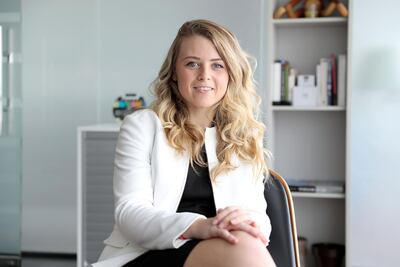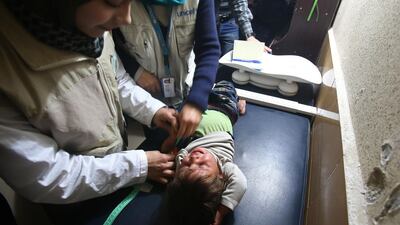Women working in the humanitarian aid sector are backing urgent and widespread reforms to halt the sexual exploitation of vulnerable people in crisis areas.
Reports in the UN-backed Voices from Syria 2018 telling of abuse prompted UAE charity workers to use International Women's Day to bring about change.
More women appointed to high-ranking positions would help reforms, they said.
A lack of women working in senior positions and delivering aid is making the problem worse, according to Sarah Brook, 28, who has spent seven years building the Sparkle Malawi foundation to develop a community project working with orphans and school there.
“Sexual harassment is occurring everywhere we look today, but there are certain sectors that are more exposed, specifically those dealing with vulnerable people,” said Ms Brook, who was named 2017 humanitarian of the year at the World of Women Film Fair awards in Dubai.

"We need to tackle the root causes of these endemic problems. This starts by encouraging more women to get involved in the charity sector and be positioned in these developing countries. How many of these cases involve women as the perpetrator?"
Since examples of sexual exploitation by aid workers were exposed last month, UK charity watchdog the Charity Commission has received safeguarding incident reports from 26 charities.
So far, charities have admitted to the UK’s Department
for International Development that 80 more sexual harassment cases are being investigated.
“As chief executive of a small charity I have seen and experienced first-hand sexual harassment and assault,” Ms Brook said. “People are discouraged from complaining. Some of my own community members in Malawi did not think even rape was wrong.
“In a male-dominated industry, there is a common fear that if people speak the truth, the reputational damage to agencies will lead to a loss of funding.”
A fully independent regulator to carry out spot checks on charities and aid organisations is one suggested way to help clean up the sector, along with a clear line of reporting for misconduct concerns.
One refugee camp showing good practice, according to the head of a UAE cancer charity, is the Emirati-Jordanian Mrajeeb Al Fhood refugee camp.
Nora Al Suwaidi, director general of the Cancer Patient Care Society – Rahma in Abu Dhabi, recently visited the camp for Syrians fleeing the civil war.
“The kids seemed happy and well behaved, it was my first visit to a camp like this,” she said.
"It was mainly men who were delivering help at the camp. Apparently there are women working with the Emirates Red Crescent, but they were not there during our visit."
In another area, the Za'atari refugee camp in Jordan, half of the population is comprised of women and girls, yet 76 per cent of cash-for-work opportunities targeted men before a UN Women's intervention.
UN Women has since designed a female-focused cash-for-work programme as part of its Oasis safe spaces.
It is now the largest female-focused cash-for-work programme in Za’atari camp, where 87 per cent of those reached are women. “Mothers and women are the teachers in communities,” Ms Al Suwaidi said.
“If more women are there to address these communities and in positions of responsibility, we will see more progression in culture and well-being.”
________________
Read more:
Aid organisations facing financial crisis make funding plea at Dubai conference
Syrian women 'sexually exploited for aid', UN report
Britain calls for reform of global humanitarian aid system
_________________
According to UN Women, about 35 per cent of women worldwide have experienced physical or sexual violence, and gender-based violence increases in conflict settings.
More than 70 per cent of women in some crisis settings have suffered gender-based violence.
Former Costa Rica ambassador to the UN, Laura Thompson, now deputy director general of the International Organisation for Migration, said aid organisations do not have access to the intelligence required to check the background of every aid worker.
“Very often in emergencies you need a surge of people and you do not have the time to do the necessary checks,” she said. “It needs to be approached differently, with people on lists available to help in emergency situations who have been previously checked.
“We are all absolutely committed to eliminating this type of behaviour, but we have to be realistic – you cannot avoid some of these people entering aid organisations for the wrong reasons,” Ms Thompson said.
“Protection of whistle blowers is important, but you have to create an environment in which these behaviours are totally unacceptable.
“The majority of aid organisations, like mine, have internal justice systems that are extremely cumbersome.”
The UN Population Fund said women and girls face a significantly increased risk of unwanted pregnancy, gender-based violence, STIs and maternal mortality during conflict and displacement. Ms Thompson would like to see more women in senior roles in the sector, but admits it is a wider reflection of society.
“Humanitarian aid is traditionally a male-orientated field,” she said.
“There is a certain reluctance from women to take up these roles. A male circle is difficult to break – but that is the same for many industries.
“Women are willing to take the same risks as men, they are just as committed.
“The problem arises when experienced women start families, leaving a generation gap of women who should be going for senior positions.
“Organisations need to look at the make-up of selection panels. Like men, women can be extremely professional, but also extremely human.
“Refugee camps are very male-orientated environments. There is a big advantage in the contribution women make, but very often they are operating under a man.”


